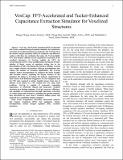VoxCap: FFT-Accelerated and Tucker-Enhanced Capacitance Extraction Simulator for Voxelized Structures
Author(s)
Wang, Mingyu; Qian, Cheng; White, Jacob K; Yucel, Abdulkadir C
DownloadAccepted version (2.894Mb)
Open Access Policy
Open Access Policy
Creative Commons Attribution-Noncommercial-Share Alike
Terms of use
Metadata
Show full item recordAbstract
© 1963-2012 IEEE. VoxCap, a fast Fourier transform (FFT)-accelerated and Tucker-enhanced integral equation simulator for capacitance extraction of voxelized structures, is proposed. The VoxCap solves the surface integral equations (SIEs) for the conductor and dielectric surfaces with three key attributes that make the VoxCap highly CPU and memory-efficient for the capacitance extraction of the voxelized structures: 1) VoxCap exploits the FFTs for accelerating the matrix-vector multiplications during the iterative solution of the linear system of equations arising due to the discretization of SIEs; 2) during the iterative solution, VoxCap uses a highly effective and memory-efficient preconditioner that reduces the number of iterations significantly; and 3) VoxCap employs the Tucker decompositions to compress the block Toeplitz and circulant tensors, requiring the largest memory in the simulator. By doing so, it reduces the memory requirement of these tensors from hundreds of gigabytes to a few megabytes and the CPU time required to obtain the Toeplitz tensors from tens of minutes (even hours) to a few seconds for very large-scale problems. VoxCap is capable of accurately computing capacitance of arbitrarily shaped and large-scale voxelized structures on a desktop computer. VoxCap's accuracy, efficiency, and capability are demonstrated through capacitance extraction of various large-scale structures, including the parallel meander lines discretized by more than a hundred million panels and analyzed on a commodity desktop computer.
Date issued
2020Department
Massachusetts Institute of Technology. Department of Electrical Engineering and Computer ScienceJournal
IEEE Transactions on Microwave Theory and Techniques
Publisher
Institute of Electrical and Electronics Engineers (IEEE)